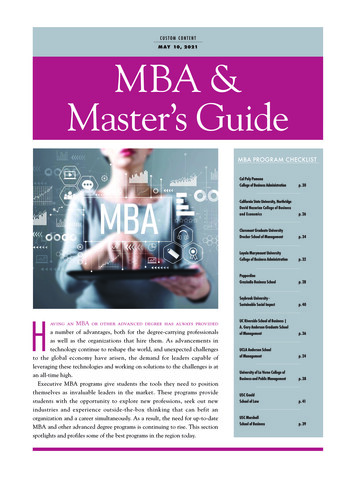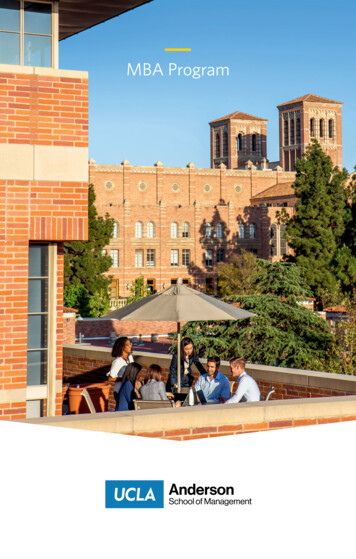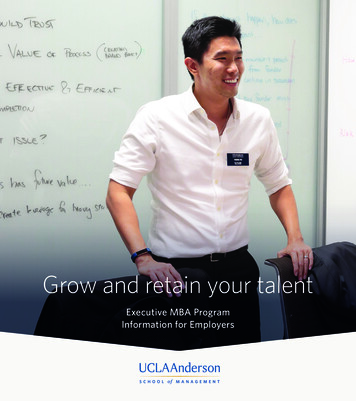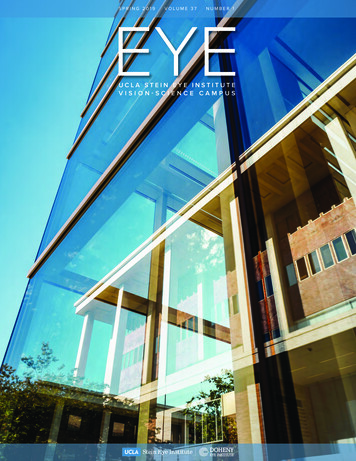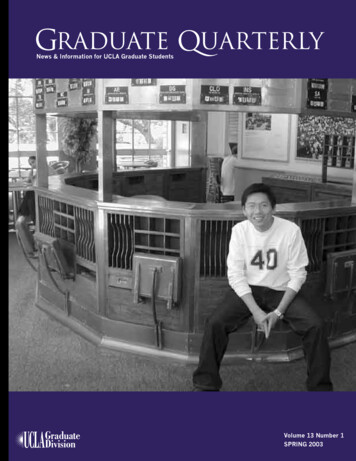
Transcription
News & Information for UCLA Graduate StudentsVolume 13 Number 1SPRINGFALL200320031
MESSAGE FROM THE dEANDEAN’S OFFICEMoney, as in most domains of life, plays a complicated role in graduate educa-students who receive large fellowship awards continuously for several years oftenwhose funding combines fellowships with teaching and research assistantships.William H. Worger - Associate Deanacademic apprentice resources, and ultimately, the academic quality and reputation of our graduate degree programs. The UCLA facultyand administration are actively engaged in various efforts to supplement state revenues with private fundraising and increased fellowshipsupport from extramural agencies and foundations.We take care to put the resources we have in service of our most important goals: facilitating degree completion by individual students and enhancing the overall quality of graduate training. The Quality of Graduate Education program described in this issue of theGraduate Quarterly is a recent effort to accomplish both goals, supporting individual students while creating programs that will continueto enhance educational quality after those individuals have received their degrees and moved on.The Graduate Division’s Dissertation Year Fellowship is a long-standing effort to invest available funds in programs with specificcriteria and objectives. For the academic year 2003-2004, 280 students applied for Dissertation Year Fellowships and 126 received awards.To be selected, students must be making timely progress toward their degree, and provide compelling evidence that they will completetheir dissertations within the year that the funding supports. This issue of the Graduate Quarterly includes profiles of a few of thesePhillip ChanningPhillip ChanningOn the other hand, when graduate students find it necessary, simply to pay theFunding for graduate student support is currently being impacted by the state budget crisis. At stake are UCLA’s fellowship andGlen Winans - Assistant Dean, Administrationment process, monitoring their training and experiences, and providing other administrative services. Issues surrounding postdoctoraleducation and training have been a topic of national concern for the past several years, and UC has developed a new policy statementcovering the status and treatment of postdoctoral scholars. This is of interest beyond the 1,100 postdoctoral scholars at UCLA. Sinceabout 23% of all PhD students at UCLA go on to postdoctoral positions, many current graduate students may find the Graduate Quarterlyarticle on this new policy of particular relevance and interest.Our hope is that the funds we invest in fellowships and related programs will foster a better educational experience for as manygraduate students as possible. You might want to look at our website, www.gdnet.ucla.edu, to learn more about what is available andMeasuring the Quality ofGraduate EducationThe Quality of Graduate EducationProgram helps students and enhancesgraduate programs.Protecting the PostdocsA new policy by the UC Office ofthe President has the best interestsof postdocs at heart.Graduate Admissions/Student andAcademic AffairsDaniel J. Bennett - DirectorGraduate Budgets and PersonnelEdna Joe - DirectorGraduate Outreach, Diversity & FellowshipsChérie Francis - DirectorGraduate Student SupportLynn Gold - DirectorInformation TechnologyCarol King - DirectorInstitutional Research andInformation ServicesPamela L. Taylor - DirectorDissertation Year Fellowship recipients.Although the Graduate Division does not provide funding for postdoctoral scholars, we are responsible for handling the appoint-8John V. Richardson, Jr. - Associate Deantake longer to complete their degrees—and are less likely to finish—than studentsare choosing between major research universities.4Shirley Hune - Associate Dean,Graduate Programscounts is not just the amount of money but the way it is distributed. GraduateAlso, competing offers of financial support are a big factor when the best studentsFEATURE ARTICLESJim Turner - Assistant Vice Chancellortion. National studies and some findings at UCLA suggest, for example, that whatgoals, a negative impact on academic motivation and performance is likely to follow.ContentsClaudia Mitchell-Kernan Vice Chancellor, Graduate StudiesDean, Graduate DivisionDear Graduate Student,rent and eat, to work in jobs that have no relationship to their studies and careerUCLA Graduate DivisionGRADUATE QUARTERLYMary Watkins - EditorSTUDENT PROFILESNEWS16121820Jason HsuFinanceJune WuEnvironmental Health SciencesDalia YasharpourNear Eastern Languagesand Cultures1422262003 Doctoral CommencementHooding CeremonyGraduate Student WelcomeReceptionGraduate Fellowship RecipientsGraduate StudentAccomplishmentsOn the Cover: Jason Hsu, Financemajor, in front of a vintage New YorkCity stock exchange booth in theAnderson School.Jacqueline Tasch - WriterPlease send correspondence to:1252 Murphy HallBox 951419Los Angeles, CA 90095-1419graduatequarterly@gdnet.ucla.eduhow you can apply. The staff in the Graduate Division Outreach, Diversity & Fellowships Office (1252 Murphy Hall) are also availableto assist students in identifying fellowship opportunities for which they are especially well-qualified.Claudia Mitchell-KernanVice Chancellor, Graduate StudiesThe Graduate Quarterly is published Fall, Winter, and Springquarters by the UCLA Graduate Division We welcome suggestions and comments, which may be printed selectively infuture issues. Current and archived copies of this publicationare available to view or to download in PDF format on theGraduate Division website.www.gdnet.ucla.eduCopyright 2003Regents of the University of California2GRADUATE QUARTERLYFALL 20033
FEATURE STORYMeasuringWthe Quality of Graduate EducationBy Jacqueline Taschhat is required for a studentcialization and preparation of studentsto have a high-quality graduatefor teaching and professional careerseducation? What is required for aare among the Graduate Council’s sug-department, or a university, to excelgested ways to promote quality gradu-in providing one?Recently, these questions have inspiredconsiderable discussion, both nationallyate programs. Markers of quality are alsoprovided for general issues like recruiting,mentoring, and research guidelines.and at UCLA. New data-gathering andThis university-level statement estab-analytical tools make it easier to deter-lishes criteria and sets goals. However, themine what works well and what doesn’t,recipe for excellence must be written indi-but only people can turn those findingsvidually by every graduate program. Theinto programmatic improvements. Thus,Graduate Division has developed the Qual-a reform mindset has become prevalentity of Graduate Education program within doctoral education.the goal of fostering regular reflection andAmong other issues, the need to expandinnovation department by department andour definition of excellence beyond theprogram by program. QGE is designed tousual categories—subject area mastery andstimulate thoughtful review and to provideindividual research contributions—has beenfinancial support for carefully targetedwidely accepted.change at the program level.“Students can no longer achieve successIn the accompanying stories, you’llby mastering research and technical skillslearn how the QGE grant-making pro-in graduate school while waiting until theygram works and how it helps studentsare on the job to learn the art of teaching,and enhances graduate programs. Youthe ethics of practice, the responsibilities ofwill also see how four departments inservice, and the navigating of professionaldifferent disciplines have implementedorganizations,” William G. Roy of UCLA’stheir QGE proposals.Graduate Council says in an introduction toa just-released document called Excellencein Graduate Education: Programmatic Issues. “These abilities must be built into thegraduate school process in order to turn outprepared professionals.”Flowing from this conclusion, more thana dozen criteria related to professional so-4GRADUATE QUARTERLYTo learn more about the GraduateCouncil’s statement on excellence, pleasego to the Graduate Division .htmFOR SOME STUDENTSQGE means help makingit through the first difficultyears of graduate studies, getting relief from teaching responsibilities orextra time to complete coursework.For others it means help making the transition to a professional career: writing journalarticles, presenting conference papers, andlearning the teaching skills that may be animportant factor in landing good jobs.Most receive support to further their research. For many, this means spending theirsummer vacation making progress towardacademic goals—learning languages and newresearch methods, turning classroom essaysinto professional papers—rather than takingany job just to help make ends meet.All of these goals are achieved throughthe Graduate Division’s Quality of Graduate Education (QGE) program, whichsupports departmental efforts to helpgraduate students make the most of theirtime at UCLA. The program allots about 1million annually through a competitive process: Rather than simply asking for moneyto support their students, departments mustpresent a plan showing that the student support will contribute toward improving theirgraduate programs.“Everybody needs money—graduateprograms and graduate students most ofall,” says Vice Chancellor of GraduateStudies Claudia Mitchell-Kernan. “Ourhope for this Graduate Division programis to accomplish a number of goals at thesame time: to support students, yes, but alsoto enhance the quality of the educationthey receive at UCLA and to make lastingimprovements to the graduate programsin which they participate. It’s also a way toreward departments and students who aredoing the best work.”Since the program was initiated in 2002,37 departments have shared more than 2million for the support of continuing gradu-ate students. To apply, departments mustspecify how much money they need, howit will be used, how that investment will payoff in terms of educational quality, and howoutcomes will be measured. All funds mustend up supporting students, rather than being used for faculty salaries, equipment orsoftware, guest speakers, or outreach andrecruitment.Proposals are reviewed and rated bythe Academic Deans and the GraduateCouncil Subcommittee on Fellowshipsand Awards. The Dean and the AssociateDeans of the Graduate Division make thefinal selections.Successful proposals include a rationalethat ties the QGE grant to larger goals forgraduate education. For example, theDepartment of Philosophy identified aparticular hurdle in the road toward speedycompletion of the PhD: finding time tothink about dissertation research whileteaching year-round to earn money. Theirproposal asks for funds to support studentsin the summer following their third yearof studies, so they can take a break fromteaching and devote themselves full-timeto producing a first draft of their proposalfor the fourth-year qualifying exam, whichis linked to their dissertation.With the same goal—reducing time todegree—the Departments of Musicology,English, and Geography asked for funds tosupport students during their dissertationwriting. Geography added travel expenses toits request and specified that winners of itsfellowships would be expected to present apaper at the annual meeting of the Association of American Geographers.Professional socialization is a frequenttheme of the proposals. For example, theDepartment of Biostatistics asked for fundsto send ten students to “high-profile professional meetings,” especially the Joint Statistical Meetings, which draws several thousandstatisticians each year.Successful proposals includea rationale that ties the QGEgrant to larger goals forgraduate education.Another theme is funding graduate students during the summer break for activitiesthat include: Turning course papers written duringthe academic year into journal articlesand conference papers (East AsianLanguages and Cultures) Attending seminars at prestigious scientific institutes (the InterdepartmentalProgram in Neuroscience) Taking intensive language courses thatmean faster progress toward a degree(Musicology) Finishing work on incomplete coursestaken during a hectic first year of studies(Philosophy)“Requests for funding tend to reflectdisciplinary cultures,” says Assistant ViceChancellor Jim Turner. “Departments inthe humanities and social sciences are often looking for summer support or travelexpenses to professional meetings, while thephysical and life sciences may want to givenew students a head start on research.”Dr. Turner warns that “simply emulatingthe strategies of other departments is notnecessarily the road to success in obtaining QGE support.” In making awards, theGraduate Division is looking for evidencethat the funds will contribute to the specificgoals and strategies of each department forimproving doctoral education.“The idea is to get the faculty to thinkcreatively about issues related to graduateeducation,” Dr. Turner says. “We want adescription of the process that took placein reaching goals.” Another asset is evidencethat the department has additional strategiesfor reaching the goals in its QGE proposal—for example, conducting a seminar on writingFALL 20035
FEATURE STORYjournal articles, offering awards for teaching,or encouraging faculty mentorship.Finally, departments must explain howthey will evaluate the results. Most ask forwritten or verbal reports from students whoreceive funding and in some cases from theirmentors. Improvements in time to degreewhat thecan also be measured. “Departments mustnot only think carefully about how a little bitof extra money would help but also considerhow to find out if the investment worked,”Dr. Turner says.Vice Chancellor Mitchell-Kernan believes the overall results are encouraging.“In the two years since the QGE programbegan, we’ve seen a variety of new initiativesin graduate programs across the campus whichgo well beyond providing financial supportfor individual students. Programmatic innovations create an enduring legacy that will benefitgraduate students for years to come.”the Success StoriesDEPARTMENT OF CHEMISTRYAND BIOCHEMISTRYProposal:Support first-year students so they candefer teaching until the second quarter oftheir graduate work.Rationale:Most incoming graduate students facethe challenge of adapting to a new universityand working as teaching assistants for thefirst time. Graduate students in Biochemistry and Molecular Biology (BMB) are alsorequired to begin a series of three laboratoryrotations that will lead to selecting their doctoral research area. And, in 2002, the BMBstudents faced a new first-quarter course, a10-unit intensive survey of four core areasin biochemistry.With coursework and research requiring major time commitments, postponingTA assignments until the Winter Quarterseemed an appropriate remedy. “We thoughtit was important for students to immersethemselves in the first-quarter researchgroup,” says Professor Albert Courey, whodrafted the proposal with Biochemistry Professor Kendall N. Houk after consulting anumber of departmental committees.Outcomes:Faculty saw dramatic increases in thequality of the Fall Quarter rotations andsignificant improvements in the scientific sophistication of first-year students. By the timeStuart Sievers took up a teaching assignment6GRADUATE QUARTERLYin Winter Quarter, he said he had “learneda lot about how to manage my schedule ingraduate school.” Another student, FrankRigo, felt that the “knowledge and confidencegained through the intensive course helpedme a lot when I first started TAing.” In addition, the new first-year curriculum “buildsan esprit de corps among the students,” saidProfessor Courey. “They really got to knoweach other a lot better than our first-yearclasses in the past, and using each other asresources should benefit their education.”DEPARTMENT OF EAST ASIANLANGUAGES AND CULTUREProposal:Provide students with summer supportto take accelerated language classes and toprepare papers for publication.Rationale:The Department requires fluency inJapanese and Chinese. “Because theselanguages are recognized as among themost difficult to learn,” former Directorof Graduate Studies David Schaberg says,“taking these classes tends to slow thingsdown.” Intensive summer classes coverthree quarters worth of material. The Department also encourages students to usetheir research to prepare journal articles,as publications can provide an edge whenseeking jobs. About a dozen students competed for three fellowships in each area.Initially, Professor Schaberg had mixedfeelings about the QGE program. “For ourdepartment at least,” he says, “it might havebeen better to have more freedom in usingthe funds, but on the other hand it was goodto be challenged to come up with some newprograms.” Student Affairs Officer AndreaBeard helped prepare the proposal.Outcomes:Thanks to the intensive Chinese language course Koichi Haga took this summer, he is taking Classical Chinese this fall,which will directly help his study of Japaneseliterature and cultures. The summer classinvolved two hours of lecture and two hoursof discussion, as well as two or three hoursof study, Monday through Friday. “Thefaster we can master elementary and intermediate levels, the more time we can spendon our research,” Koichi says. Shayne Clarkeused his summer fellowship to revise a paperon the nonexpulsion of Buddhist monksfrom Indian monasteries for sexual offenses.He also finished two other papers, and he isexploring possibilities for publication in allthree cases. By letting him “focus on academic writing outside of graduate coursework,” the fellowship was “an invaluableenhancement to my studies,” he says.DEPARTMENT OF POLITICAL SCIENCEProposal:Provide mentoring and support whilestudents develop and teach their own upper-division lecture classRationale:INTERDEPARTMENTAL PROGRAMAt least half of political science graduates seek careers as professors, and the department “came to the conclusion that weweren’t doing enough to train our graduatestudents in how to teach,” says Vice Chair ofGraduate Studies Deborah Larson. “Being aTA has nothing to do with the demands ofa lecture class,” she says. Professors need todistill information into an accessible format,develop public speaking skills, learn how toprepare a syllabus, and gain experience indealing with questions and interruptions.“We think that the best way to train peopleto teach is by letting them apprentice under an experienced teacher,” she says. Thedepartment’s program assigned three ABDfellows to faculty mentors for an academicyear, during which they acquired pedagogical skills and put them into practice developing and teaching a course related to theirdissertation research.IN NEUROSCIENCEOutcomes:All three courses were taught in SpringQuarter of 2003, and fellows said “that itwas a very valuable experience,” ProfessorLarson said, “perhaps the best teachingexperience they will ever have.” MonicaArruda de Almeida taught 30 studentsabout the economy of Brazil. Althoughthe undergraduates found the going difficult at first, all of them did well. Monicawanted to “give students the skills to readanything and be able to understand it.”Nevertheless, she swapped more challenging journal articles for easier-to-readstories in financial newspapers at therecommendation of the faculty selectioncommittee. “The experience of lecturing gives you a lot of confidence,” saysMonica, and it also helped her with herdissertation. “When you have to teachsomebody,” she says, “you are forced tothink more deeply” about your subject.One evidence of the program’s success isthat a dozen students applied for the threefellowships that start this fall.Students SayProposal:FRANK RIGOPay expenses to send students to specialized courses at research institutesChemistry &BiochemistryRationale:The “knowledgeand confidencegained throughthe intensivecourse helped mea lot when I firststarted TAing.”Cold Spring Harbor, Woods Hole,the Jackson Laboratory: These are someof the renowned research institutes thatoffer specialized courses related to neuroscience—courses taught by world-classexperts in their fields. Attending thesecourses can greatly enhance a graduatestudent’s research skills and also contributeto the research enterprise at UCLA. “In myown laboratory, I’ve always sent people tovarious courses when I could,” says IDPChair Michael Levine. “I thought it wouldbe interesting to do this for the wholeprogram.” Students have requested travelfunds for a wide range of programs, bothin the United States and overseas. “As longas it’s a course that will enhance somebody’sresearch skills, it’s eligible for this funding,”Professor Levine says.MONICAARRUDA DEALMEIDAPolitical Science“The experienceof lecturinggives you a lotof confidence.”Outcomes:Deborah Smith was the only graduatestudent and only neuroscientist at a courseon bioinformatics at Cold Spring Harborlast June. She not only got “my feet wet,”she says, but she’ll have Web access to classmaterials “to refresh my memory at futurestages of my research.” Fred Sabb attendeda brain imaging program at New York University in September. “My field of imagingis heavily driven by technique,” he says, andhe now has “a better understanding of whatnew techniques are on the horizon.” Fredalso met one or two investigators—and potential postdoctoral employers or collaborators—with whom he plans to stay in touch.“Learning how to network is very importantfor young scientists,” Professor Levine says.“People you know or who know you” canbe helpful over the course of a career, andmeeting them “doesn’t always happen if youjust sit in a laboratory,” he says.FRED SABBNeuroscience IDPHe now has“a betterunderstandingof what newtechniques areon the horizon”DEBORAH SMITHNeuroscience IDPShe’ll have Webaccess to classmaterials “torefresh mymemory atfuture stagesof my research.”FALL 20037
ProtectingPostdocstheTWhile UCLA has enjoyed “apostdoc friendly administration,” says Eileen AndersonFye, a postdoctoral fellow who serves onUC and UCLA policy-making committeesrelated to her peers. “I believe this policy hasthe best interests of postdocs at heart.”The UC document is intended toprovide a general framework and corerequirements regarding postdocs, althoughindividual campuses will have some discretion in how to achieve UC’s goals.“The idea is to bring some consistency,equity, and fairness to the process,” saysAssociate Dean of the Graduate DivisionJohn V. Richardson, Jr., who is responsiblefor policies affecting postdoctoral scholarsand visiting scholars at UCLA.For example, the new policy specifiesthat postdoctoral scholars should normallyreceive full-time appointments. In the past,some prospective postdocs from overseasmay have accepted less than full-timesalaries while working more than full-timehours, simply for the opportunity to studyin the United States. These instances will nolonger be approved, Dean Richardson says,although some exceptions to the full-timepolicy may be granted for reasons relatedto sickness or family demands.The UC policy also imposes a five-yearlimitation on the length of service as apostdoctoral scholar—at any campus—topreserve the nature of these appointments.Postdoctoral positions are intended to provide “a chance to learn in a laboratory orKyle Cunningham is coordinator of postgraduate research appointments at UCLA,handling salary, health insurance, and other matters related to postdoctoral scholars.“Because of Kyle, who is a tireless advocate for us, UCLA is one of the leaders inthe system” when it comes to serving the interests of postdocs, according to EileenAnderson-Fye, who is UCLA’s representative to the UC Council of Postdoctoral Scholars,a systemwide organization.Rules about the nature and length of postdoctoral appointments.A common salary or stipend scale.Mandatory health insurance.Provisions for time off, sick leave, annual reviews, and grievances.8GRADUATE QUARTERLYhese are among the areas covered bya new UC Office of the Presidentpolicy for postdoctoral scholars—1,100 of them at UCLA alone.FALL 20039
other environment with a senior scholar,and the idea is that you go on to start yourown lab, have your own career,” DeanRichardson says. People who have becomeintegral to a research project should be hiredas staff researchers, he adds.The salary range stipulated in the newUC policy will have relatively little impacton UCLA postdocs, according to Kyle Cunningham, the Graduate Division’s coordinator of postgraduate research appointments.UCLA’s salary levels exceed the 29,000minimum UC establishes. The impact ofbenefit requirements will vary.Most postdocs at UCLA apply directlyto departments and are funded through theresearch budgets of faculty who are principal investigators. In the past, they havereceived their salaries through the UCLAPayroll Department, which made themeligible for the vacation, sick leave, healthinsurance, and pension benefits available toall employees. Postdoctoral employees appointed in this fashion before July 1, 2004,will be allowed to continue in this manner.More changes will be felt by those postdocs who receive individual fellowships directly from outside funding agencies —theNational Institutes of Health is one—andchoose to do their work at UCLA. In thepast, these postdoctoral fellows were paidthrough the Graduate Division and receivedhealth insurance through a special programthe Division established, with premiumsusually—but not always—paid throughtheir grant. They had no guaranteed vacation or sick leave time and no pensionparticipation. The new system means theywill now be entitled to the same health insurance coverage given to the postdoctoralemployees, time off during intersession andrecess periods (totaling about four weeks),POSTDOCTORAL SCHOLARINFORMATION ON THE WEBFor more information about the new UCOP Postdoctoral policy and otherinformation for postdoctoral scholars, visit the following web pages:Graduate Division website for Postdoctoral Scholarswww.gdnet.ucla.edu/postdocs.htmlAcademic Personnel Policy (APM 390)on Postdoctoral -03.htmlUC Council ofPostdoctoral Scholarspostdocs.ucdavis.edu/uccps.htm10GRADUATE QUARTERLYand leaves related to sickness and otherpersonal issues.All postdocs appointed after July 1,2004, will receive the same benefits justdescribed. The benefits would be equalized to the extent possible under Federaland State laws.The new UCOP policy also requiresthat mentors conduct annual reviews withpostdoctoral scholars, discussing their progress and career potential. In the past, UCLArecommended but did not require such reviews. Whether the UC-mandated reviewswill need to be in writing is undecided. “Wedon’t want this to be an additional task forfaculty mentors,” Cunningham said.The UC grievance policy for postdocsis also likely to have little campus impact.“Thankfully, we don’t have to deal withmany grievances at UCLA,” Cunninghamsaid. Only two were filed and processedduring the 2002-2003 academic year.An administrative goal of the UC policyis to achieve a more accurate accounting ofhow many postdoctoral scholars work andstudy on UC campuses. While the GraduateDivision keeps central records at UCLA,not all campuses do so. Even the UCLAdata may not reflect the latest informationavailable at the department level.To obtain more accurate data, the UCpolicy asks that all UC postdocs be appointed through the central campus payrollsystem, using three new title codes that reflect their funding source. This would makecurrent data readily available to sponsoringdepartments, the Graduate Division, andthe Office of the President. At UCLA, thepractical implementation of administeringpostdoctoral appointments in this manneris still under discussion.So far, there have been relatively fewquestions regarding the new policy, Cunningham says, and most of these have come fromdepartments rather than from the postdocs.“I like to think they’ve been quiet becausethey’ve been well cared for,” he says.Eileen Anderson-Fye, founding president of the UCLA Society for Postdoctoral ScholarsTHE UCLA SOCIETY FOR POSTDOCTORAL SCHOLARSAs the academic yearham, the Graduate Division’s coordinatorwho are interested in policy. One mightbegins this fall, there’sfor postdoctoral issues, has been doing asucceed her as UCLA’s delegate to thea new organization ongreat job. “Many other places don’t haveUC Council, but others are needed “tocampus: the UCLA So-an advocate for postdocs on campus, somake sure there’s a postdoctoral scholar’sciety for Postdoctoralthe organizations have developed to ad-voice on major committees both at UCLAvocate for themselves,” she says.and UC.”Scholars, headed by founding presidentEileen Anderson-Fye.But as she asked around at UCLA, sheAmong other projects, the SocietyInspired by her own experiences asfound there were other needs. For exam-is developing an orientation packagea new postdoctoral fellow in 2002, Dr.ple, postdocs are hungry for informationfor postdocs that should be available byAnderson-Fye volunteered to serve onon career development. Some expressedWinter Quarter. It will also help organize athe UC Council of Postdoctoral Schol-an interest in social events that wouldGraduate Division survey of postdoctoralars, a systemwide organization. Thereoffer an opportunity to meet their peersscholars, which will probably get undershe learned that UCLA was one of onlyelsewhere at UCLA.way in Fall 2004.two campuses that had no organizationAlthoughFor more information, contact Dr. Ander-advocacy will not be a primary function,son-Fye at eileenaf@ucla.edu or Kyle Cun-Why not? she asked herself. The rea-at least for now, Dr. Anderson-Fye is hop-ningham at kcunning@gdnet.ucla.eduson, it turned out, is that Kyle Cunning-ing to recruit a small group of
Vice Chancellor, Graduate Studies FEATURE ARTICLES 4 Measuring the Quality of Graduate Education The Quality of Graduate Education Program helps students and enhances graduate programs. 8 Protecting the Postdocs A new policy by the UC Office of the President has the best interests of postdocs at heart. Phillip Channing STUDENT PROFILES 16 Jason .

